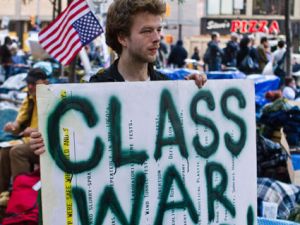On Thursday evening, residents of 83 towns and cities throughout the country—places like Marietta, Georgia, and East Troy, Wisconsin, and Anchorage, Alaska—will make their way to the home of a friend or neighbor or outright stranger for a night of partying. But these aren't holiday parties. They're the ground-level rumblings of a growing campaign to roll back one of the most game-changing Supreme Court decisions in recent memory, Citizens United v. Federal Election Commission.
In a year packed with populist uprisings, in which Time named "the protester" its person of the year, the fight against Citizens United is gaining momentum with battle fronts in Congress, statehouses, city halls, and the homes of hundreds of Americans. The decision, handed down in January 2010 by the court's five conservative justices, effectively gave corporations the same free speech rights as people, gutted key provisions of the 2002 McCain-Feingold campaign finance law, and green-lighted unlimited spending by corporations and labor unions in American elections. Fred Wertheimer, president of Democracy 21, a pro-reform campaign finance organization, called it "the most radical and destructive campaign finance decision in Supreme Court history."
In a year packed with populist uprisings, in which Time named "the protester" its person of the year, the fight against Citizens United is gaining momentum with battle fronts in Congress, statehouses, city halls, and the homes of hundreds of Americans. The decision, handed down in January 2010 by the court's five conservative justices, effectively gave corporations the same free speech rights as people, gutted key provisions of the 2002 McCain-Feingold campaign finance law, and green-lighted unlimited spending by corporations and labor unions in American elections. Fred Wertheimer, president of Democracy 21, a pro-reform campaign finance organization, called it "the most radical and destructive campaign finance decision in Supreme Court history."

















